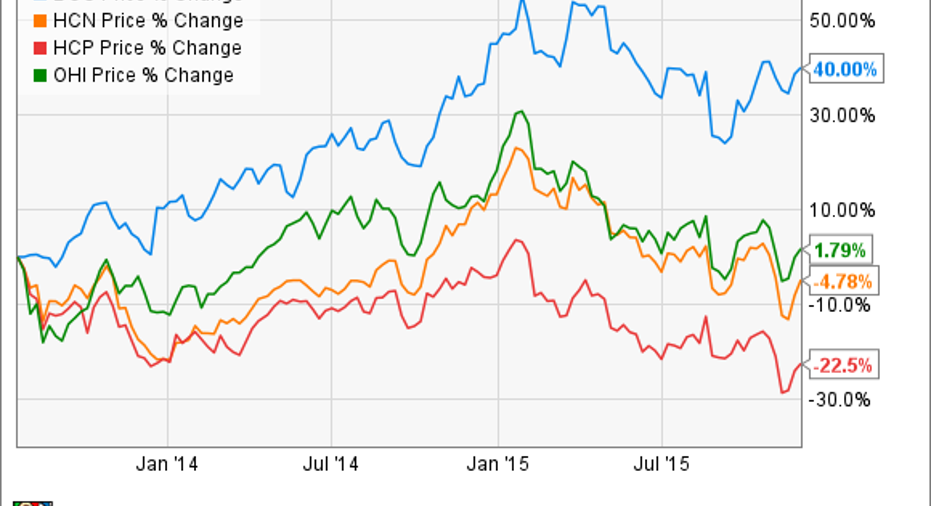Physicians Realty Trust: A High-Dividend Stock With Tremendous Upside Potential

Physicians Realty Trust is a real estate investment trust (REIT) specializing in healthcare real estate. Not only does this relative newcomer pay an impressive 5.6% dividend yield, but the company has potential to deliver market-beating total returns if its early performance is any indication of the future. Here's what you need to know about Physicians Realty Trust, and how it stands out from the competition.
About Physicans Realty TrustPhysicians Realty Trust is a REIT that invests in healthcare properties. The company currently owns 146 properties in 25 states representing 5.4 million square feet of leasable space, mostly in the eastern half of the U.S. The vast majority (84%) of the portfolio consists of medical office buildings, with a small, but significant amount of hospital properties as well. A relatively new REIT, Physicians Realty Trust completed its IPO in July 2013, and has grown tremendously in the short amount of time since then.
Why should you invest in healthcare real estate?Simply put, it is a near-certainty that demand for healthcare facilities will grow during the coming decades. According to forecasts from the U.S. Census Bureau, national healthcare expenditures will increase by 67% over the next decade.
Image source: Physicians Realty Trust.
This is due to a combination of catalysts, such as the Affordable Care Act, which has provided accessible healthcare for millions of previously uninsured people, as well as the aging U.S. population. In fact, the 65-and-over population is expected to double by the year 2060, and the 75-plus and 85-plus age groups are projected to grow at an even faster rate.
Image source: Physicians Realty Trust.
Ambitious growth, but a smart balance sheetSince completing its IPO a little over two years ago, Physicans Realty Trust has grown rapidly, with total investments rising from $124 million to $1.5 billion in just over two years, including $740 million in new acquisitions this year alone.
Impressively, the company has achieved this level of growth while maintaining a conservative balance sheet. Through five follow-on equity offerings, management has been able to finance most of its acquisitions without taking on an excessive level of debt. In fact, the company's fixed charge coverage ratio of 6.2 times is more conservative than many of its healthcare REIT peers. In other words, the company earns $6.20 for every dollar in fixed charges (such as interest) that it is obligated to pay. For comparison, Welltower , one of the sector leaders, has a fixed charge coverage ratio of 3.5 times.
The strategy is simple, yet effective. Physicians Realty Trust looks to capitalize on its existing relationships with physicians and hospitals in order to buy off-market properties that could produce the best possible long-term returns for its investors. By targeting properties in the $10 million to $50 million range, there is little competition for the best deals from the larger healthcare REITs.
A limited history -- but so far, so goodI've mentioned that Physicians Realty Trust is relatively new, especially compared to some of the Healthcare REIT heavyweights many of which have impressive records. For example, Welltower has delivered an average 15.6% annual total return since its 1970 IPO, a remarkable level of performance to sustain for over three decades. So, if you want time-tested performance, Physicians Realty Trust is probably not the best choice for you.
However, the early results look promising. Since its IPO, Physicians Realty Trust has outperformed the SNL U.S. Healthcare REIT Index by more than 60%-- achieved through a combination of the smart and unique acquisition strategy and an impressive 96% occupancy rate. For comparison, here's a look at Physicians Realty Trust's performance compared with some of its peers.
A word about valuation and the competitionIt's tough to compare Physicians Realty Trust to its competition from a valuation perspective, simply because a rapidly growing company doesn't have the earnings consistency that decades-old, established companies do.
For example, when looking at Physicians Realty Trust's normalized funds from operations (or FFO, the REIT version of "earnings") over the past four quarters, we arrive at a price-to-FFO ratio of 19.3, which is admittedly on the high side of peers.
However, when you consider the fact that the company's normalized FFO has grown by 53% over the past year alone, the higher valuation could easily be justified. In fact, by extrapolating the most recent quarter's normalized FFO ($0.26) over a year, we arrive at a much more attractive P/FFO of 15.6. Based on 2015's third quarter, here's how Physicians Realty Trust stacks up to some of its peers.
Data source: Each REIT's third-quarter earnings release. FFO = funds from operations. Note: Share price and market cap as of 12/1/2015.
As you can see, Physicians Realty Trust is indeed valued at a premium to peers. Bear in mind, however, that while REITs are usually not valued as growth stocks, Physicians Realty Trust is growing rapidly, in terms of both assets and earnings, and this should be taken into account when examining its valuation.
The Foolish bottom linePhysicians Realty Trust is an ambitious new player in an area of real estate that looks quite promising over the coming decades. If the company can continue to use its relationships with physicians and hospitals to create value for shareholders, this REIT could potentially evolve into one of the sector leaders -- and make its investors lots of money along the way.
The article Physicians Realty Trust: A High-Dividend Stock With Tremendous Upside Potential originally appeared on Fool.com.
Matthew Frankel owns shares of Welltower. The Motley Fool recommends Welltower. Try any of our Foolish newsletter services free for 30 days. We Fools may not all hold the same opinions, but we all believe that considering a diverse range of insights makes us better investors. The Motley Fool has a disclosure policy.
Copyright 1995 - 2015 The Motley Fool, LLC. All rights reserved. The Motley Fool has a disclosure policy.



















